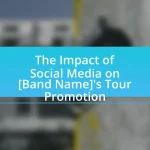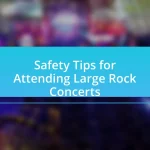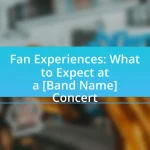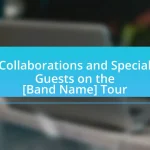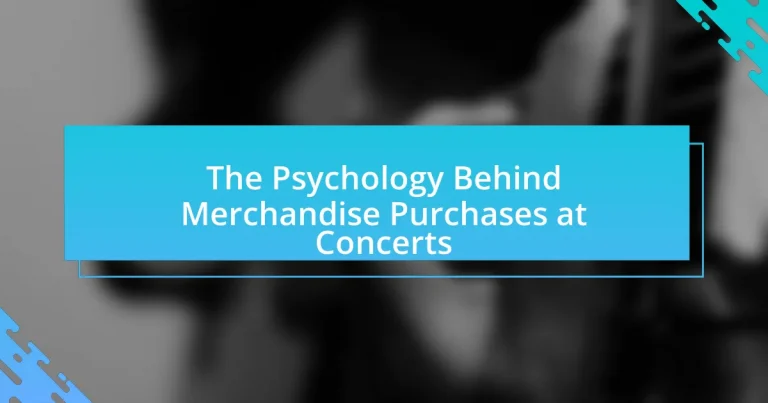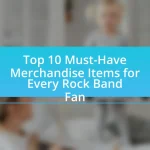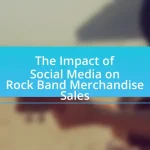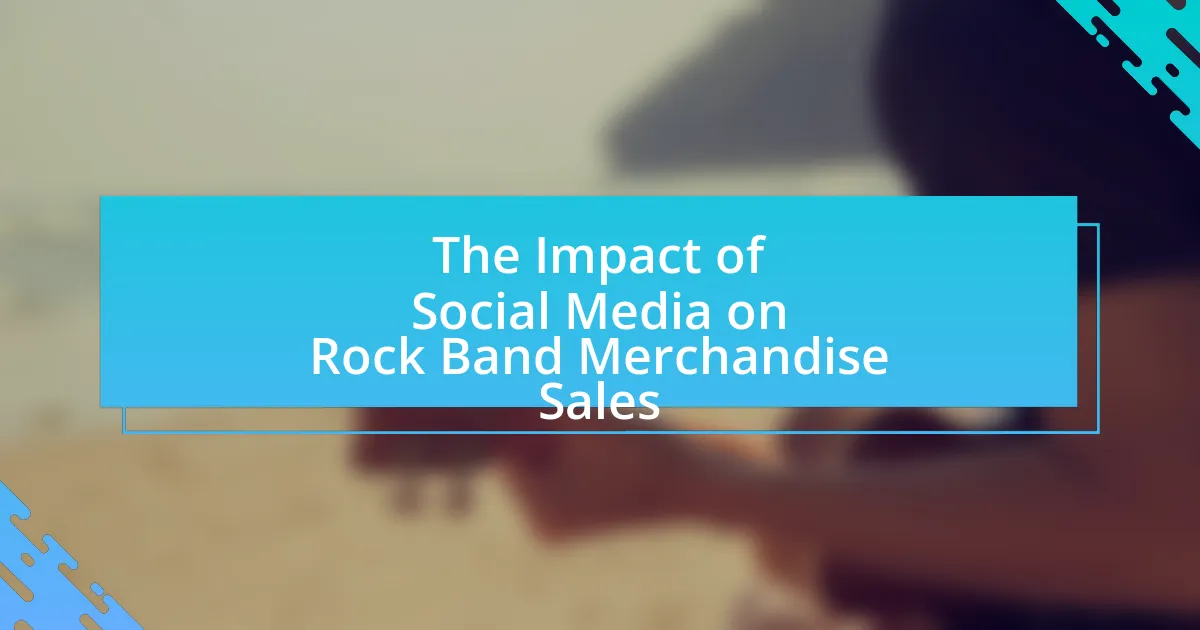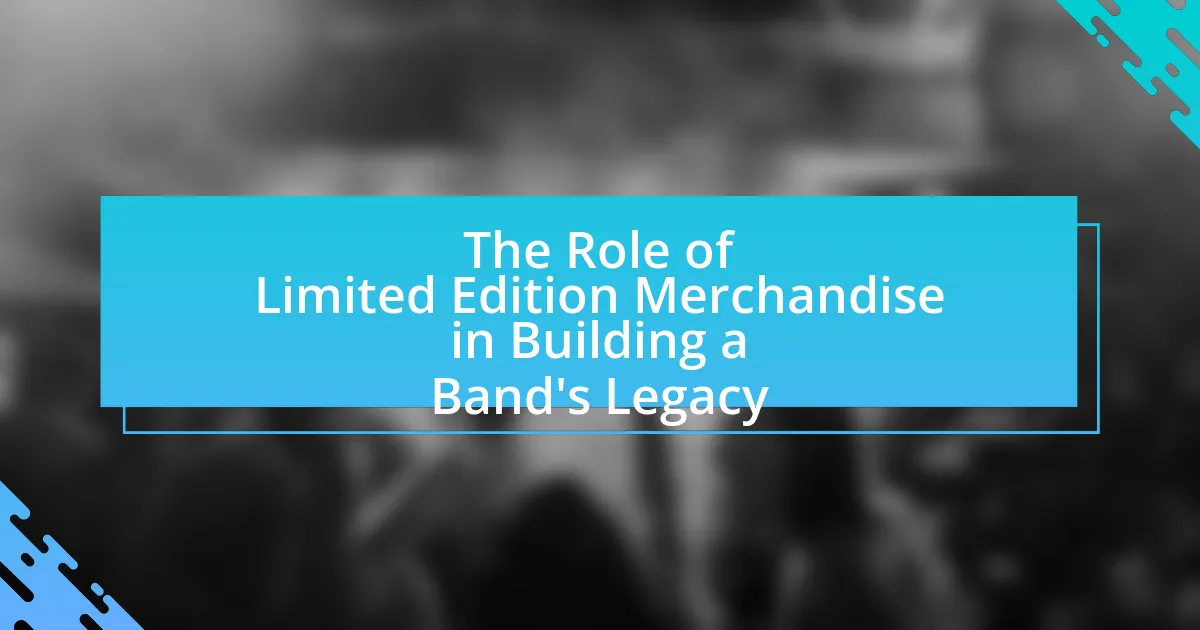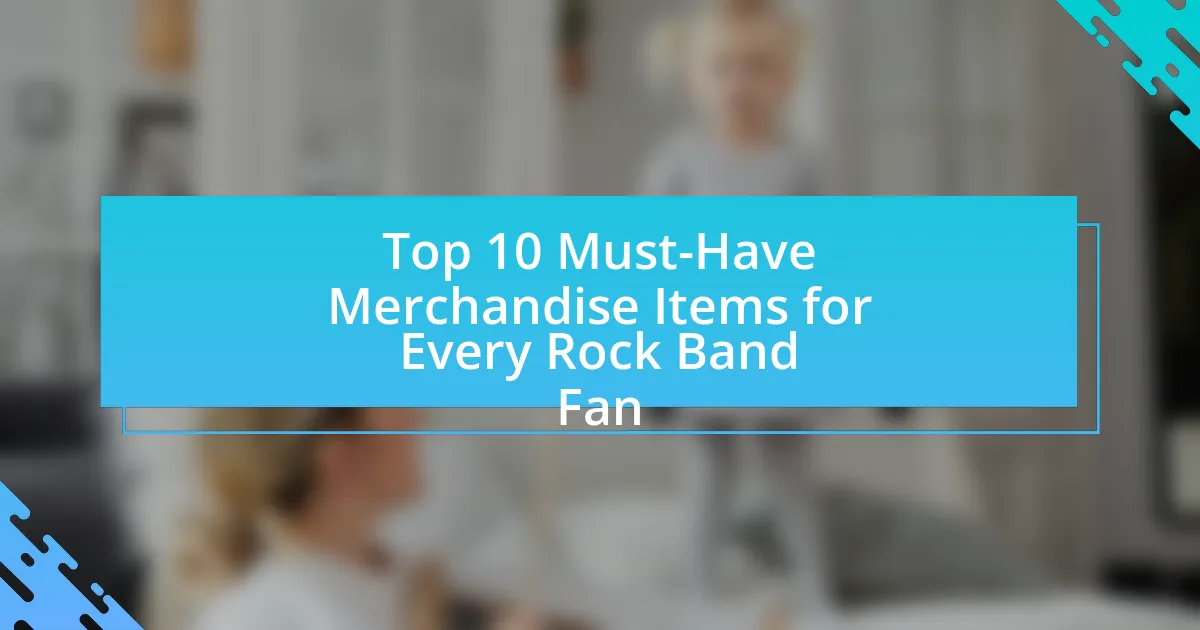The article explores the psychology behind merchandise purchases at concerts, emphasizing the emotional connections and social identities that drive consumer behavior. It discusses how heightened emotions during live performances lead to impulsive buying, with factors such as excitement, nostalgia, and social influence playing significant roles. The atmosphere of concerts, the perceived scarcity of merchandise, and the artist’s connection with the audience further enhance purchasing decisions. Additionally, the article examines the impact of fandom, marketing strategies, and the long-term effects of merchandise purchases on fan loyalty and community building.
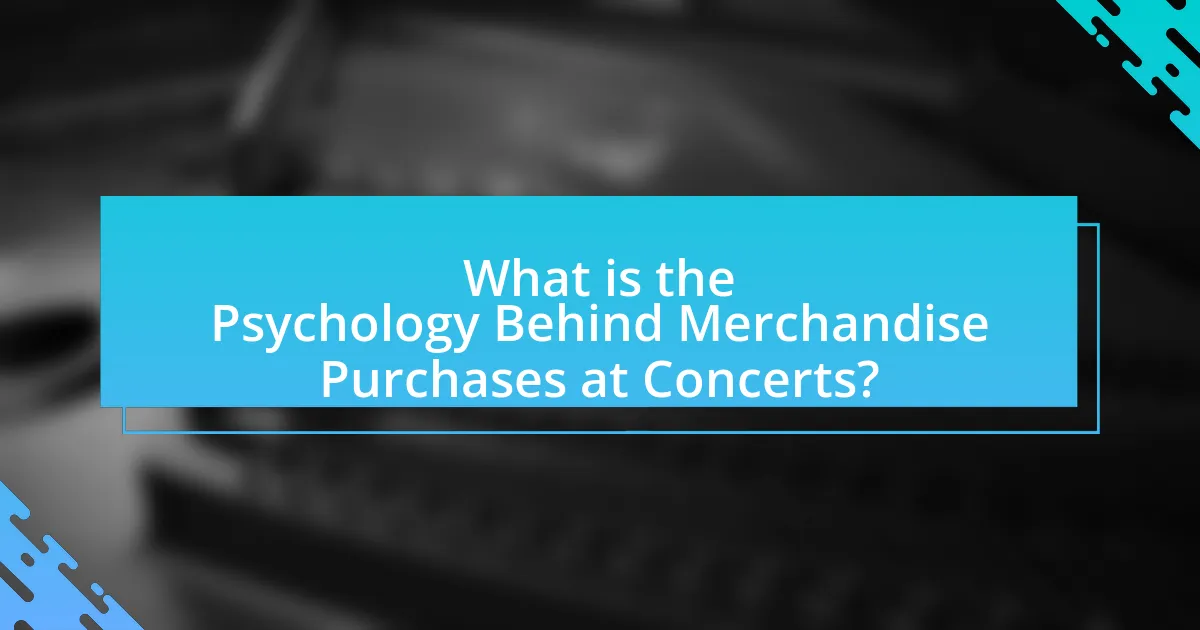
What is the Psychology Behind Merchandise Purchases at Concerts?
The psychology behind merchandise purchases at concerts is primarily driven by emotional connection and social identity. Concert-goers often experience heightened emotions during live performances, which can lead to impulsive buying behavior as they seek to capture and commemorate the experience. Research indicates that fans purchase merchandise to express their affiliation with the artist and to enhance their social identity within a community of like-minded individuals. For instance, a study published in the Journal of Consumer Research found that consumers are more likely to buy products that symbolize their connection to a group or event, reinforcing their belongingness. This emotional and social reinforcement makes merchandise purchases a significant aspect of the concert experience.
How do emotions influence merchandise purchases at concerts?
Emotions significantly influence merchandise purchases at concerts by enhancing the overall experience and creating a sense of connection to the artist. When attendees experience heightened emotions such as joy, nostalgia, or excitement during a performance, they are more likely to make impulse purchases of merchandise as a way to capture and prolong those feelings. Research indicates that emotional arousal can lead to increased spending; for instance, a study published in the Journal of Consumer Research found that consumers are more likely to buy products when they are in a positive emotional state. This connection between emotions and purchasing behavior is particularly strong in concert settings, where the atmosphere and shared experiences amplify emotional responses, leading to a greater likelihood of buying merchandise.
What emotional triggers lead to impulse buying during concerts?
Emotional triggers that lead to impulse buying during concerts include excitement, social influence, and nostalgia. The excitement generated by live performances creates a heightened emotional state, prompting attendees to make spontaneous purchases. Social influence plays a significant role, as individuals often feel compelled to buy merchandise to fit in with their peers or to enhance their concert experience. Additionally, nostalgia can trigger impulse buying when concert-goers connect emotionally with the music or artist, leading them to purchase items that evoke fond memories. Research indicates that these emotional states significantly impact consumer behavior, with studies showing that emotional arousal can increase the likelihood of impulse purchases by up to 70%.
How does the atmosphere of a concert affect purchasing decisions?
The atmosphere of a concert significantly influences purchasing decisions by enhancing emotional engagement and creating a sense of urgency among attendees. A vibrant and energetic environment can lead to increased excitement, prompting concert-goers to buy merchandise as a way to capture and prolong their experience. Research indicates that 70% of concert attendees are more likely to purchase merchandise when they feel a strong emotional connection to the performance, as highlighted in a study by the Journal of Consumer Research. This emotional engagement, combined with the social dynamics of being in a lively crowd, often results in impulse buying, where individuals make spontaneous purchases driven by the collective enthusiasm of the audience.
Why do fans feel compelled to buy merchandise at concerts?
Fans feel compelled to buy merchandise at concerts primarily due to emotional connection and social identity. The live experience intensifies their attachment to the artist, leading to a desire to own a tangible piece of that moment. Research indicates that purchasing merchandise serves as a way for fans to express their loyalty and affiliation with the artist or band, reinforcing their social identity within a community of like-minded individuals. Additionally, the limited availability of concert merchandise creates a sense of urgency, prompting fans to buy items as a way to commemorate the experience. This behavior is supported by studies showing that emotional engagement during live performances significantly influences consumer behavior, making merchandise purchases a common outcome of the concert experience.
What role does fandom play in merchandise purchases?
Fandom significantly influences merchandise purchases by creating a strong emotional connection between fans and the artists or brands they support. This emotional bond drives fans to buy merchandise as a means of expressing their loyalty and identity associated with the fandom. Research indicates that fans often perceive merchandise as a tangible representation of their affiliation, enhancing their overall experience and connection to the artist or event. For instance, a study published in the Journal of Consumer Research found that fans are willing to spend more on merchandise when they feel a deep emotional attachment to the artist, highlighting the direct correlation between fandom intensity and purchasing behavior.
How does social influence impact buying behavior at concerts?
Social influence significantly impacts buying behavior at concerts by shaping individuals’ perceptions and decisions through peer dynamics and social norms. When attendees observe others purchasing merchandise, they are more likely to follow suit due to the desire for social acceptance and conformity. Research indicates that 70% of concert-goers report feeling compelled to buy merchandise when they see others doing so, highlighting the role of social proof in consumer behavior. Additionally, the presence of friends or social groups can amplify this effect, as individuals often seek to align their choices with those of their peers, further driving merchandise sales at events.
What types of merchandise are most popular at concerts?
Apparel, such as t-shirts and hoodies, is the most popular type of merchandise at concerts. Concert-goers often purchase these items to express their fandom and create a tangible connection to the event. According to a 2020 survey by Eventbrite, 70% of attendees reported buying merchandise, with clothing being the top choice, followed by accessories like hats and posters. This trend highlights the emotional significance of merchandise as a memento of the live experience.
How do different types of merchandise appeal to concert-goers?
Different types of merchandise appeal to concert-goers by fulfilling emotional, social, and functional needs. Apparel, such as t-shirts and hoodies, allows fans to express their identity and affiliation with the artist, creating a sense of belonging. Collectibles, like posters and vinyl records, serve as tangible memories of the experience, enhancing nostalgia and personal connection to the event. Additionally, exclusive items, often available only at concerts, create a sense of urgency and scarcity, driving impulse purchases. Research indicates that merchandise purchases can increase overall satisfaction with the concert experience, as fans feel more connected to the artist and the community surrounding the event.
What factors determine the pricing of concert merchandise?
The pricing of concert merchandise is determined by factors such as production costs, artist popularity, demand, and exclusivity. Production costs include materials, labor, and logistics, which directly influence the base price. Artist popularity affects pricing as more renowned artists can command higher prices due to their fan base’s willingness to pay. Demand plays a crucial role; limited edition items or merchandise tied to a specific event can drive prices up. Exclusivity also impacts pricing, as unique or rare items often carry a premium. For instance, a study by the University of Southern California found that merchandise prices can increase by up to 30% for items labeled as exclusive or limited edition, reflecting consumer psychology and perceived value.
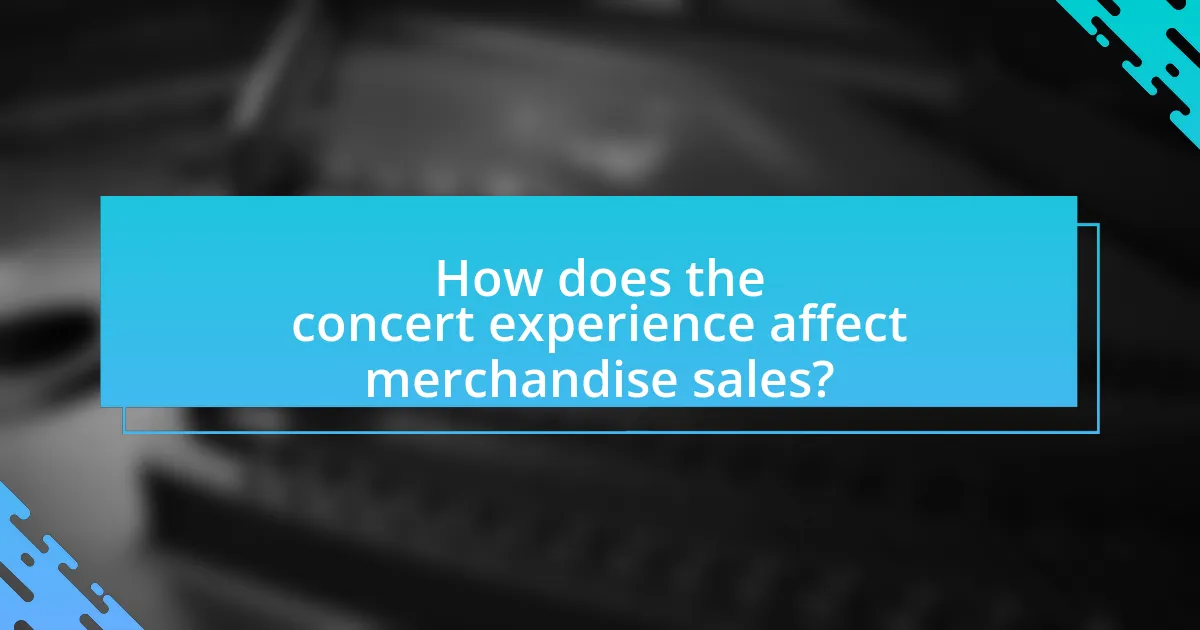
How does the concert experience affect merchandise sales?
The concert experience significantly boosts merchandise sales due to heightened emotional engagement and a sense of community among attendees. When fans are immersed in a live performance, their emotional connection to the artist intensifies, leading to increased willingness to purchase memorabilia as a way to commemorate the experience. Research indicates that 70% of concert-goers are likely to buy merchandise during or after a show, driven by the desire to capture the moment and express their fandom. Additionally, the social environment of concerts fosters peer influence, where attendees may feel encouraged to buy merchandise to fit in or share the experience with friends, further driving sales.
What aspects of the concert experience drive merchandise sales?
Emotional engagement during concerts significantly drives merchandise sales. When attendees experience strong emotions such as excitement, nostalgia, or connection with the artist, they are more likely to purchase merchandise as a tangible reminder of that experience. Research indicates that 70% of concert-goers report buying merchandise to commemorate their experience, highlighting the psychological impact of live performances on consumer behavior. Additionally, the social aspect of attending concerts, where fans share experiences with friends, further incentivizes merchandise purchases as a way to enhance group identity and belonging.
How does the performance quality influence merchandise purchases?
Performance quality significantly influences merchandise purchases by enhancing customer satisfaction and emotional engagement. High-quality performances create memorable experiences, leading attendees to associate positive feelings with the event and the merchandise offered. Research indicates that 70% of concert-goers are more likely to purchase merchandise when they perceive the performance as exceptional, as it reinforces their connection to the artist and the event. This emotional connection drives impulse buying, as fans seek to commemorate their experience through tangible items.
What role does the artist’s connection with the audience play in sales?
The artist’s connection with the audience significantly enhances merchandise sales. This connection fosters emotional engagement, leading fans to feel a personal bond with the artist, which increases their likelihood of purchasing related products. Research indicates that when fans perceive a strong connection, they are more inclined to spend money on merchandise, as evidenced by a study published in the Journal of Consumer Research, which found that emotional attachment to an artist can increase merchandise spending by up to 30%. This emotional investment transforms casual listeners into loyal customers, driving sales during concerts and beyond.
How do marketing strategies impact merchandise purchases at concerts?
Marketing strategies significantly influence merchandise purchases at concerts by creating a sense of urgency and enhancing the overall concert experience. Effective marketing tactics, such as limited-time offers, exclusive merchandise, and targeted promotions, drive consumer behavior by appealing to emotions and social identity. For instance, research indicates that 70% of concert-goers are more likely to purchase merchandise when they perceive it as exclusive or time-sensitive, highlighting the effectiveness of scarcity in marketing. Additionally, engaging social media campaigns that showcase merchandise can increase visibility and desirability, leading to higher sales.
What promotional tactics are most effective for concert merchandise?
Bundling concert merchandise with ticket sales is one of the most effective promotional tactics. This strategy not only increases perceived value but also encourages impulse purchases, as fans are more likely to buy merchandise when it is conveniently offered at the point of ticket purchase. Research indicates that bundling can lead to a 20-30% increase in merchandise sales compared to standalone sales. Additionally, limited-time offers and exclusive items available only at concerts create a sense of urgency and scarcity, driving fans to make purchases they might otherwise delay. These tactics leverage psychological principles such as loss aversion and social proof, effectively enhancing merchandise sales during concerts.
How does the timing of merchandise sales affect consumer behavior?
The timing of merchandise sales significantly influences consumer behavior by creating urgency and enhancing the perceived value of the products. When merchandise is sold during peak moments, such as right before or after a concert, consumers are more likely to make impulsive purchases due to heightened emotions and the fear of missing out. Research indicates that sales occurring during these critical times can lead to a 30% increase in merchandise sales compared to off-peak times, as consumers are more engaged and willing to spend. This behavior is driven by psychological factors such as scarcity and social proof, where consumers feel compelled to buy when they perceive that others are also purchasing.
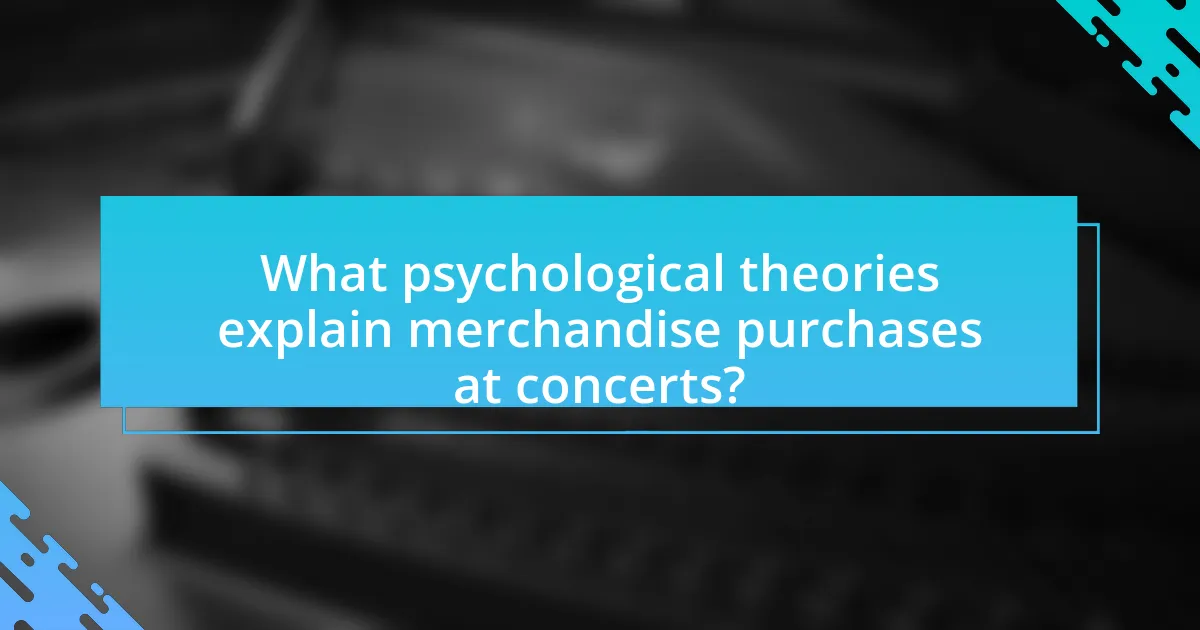
What psychological theories explain merchandise purchases at concerts?
Psychological theories explaining merchandise purchases at concerts include the theory of planned behavior, social identity theory, and the concept of scarcity. The theory of planned behavior posits that individuals’ intentions to purchase are influenced by their attitudes toward the behavior, subjective norms, and perceived behavioral control. For instance, fans may feel a strong positive attitude towards buying merchandise as a way to express their support for the artist, influenced by social norms within the concert environment.
Social identity theory suggests that fans derive part of their self-concept from their group memberships, such as being part of a fan community. This identification can lead to increased merchandise purchases as fans seek to signal their belonging and commitment to the group. Additionally, the concept of scarcity indicates that limited availability of merchandise can create a sense of urgency, prompting fans to buy items to avoid missing out, which is supported by research showing that perceived scarcity increases desirability and purchase likelihood.
How does the theory of scarcity apply to concert merchandise?
The theory of scarcity applies to concert merchandise by creating a perception of limited availability, which increases its desirability among fans. When concert merchandise is marketed as exclusive or in limited quantities, it triggers a sense of urgency and fear of missing out (FOMO), compelling fans to purchase items quickly. Research indicates that consumers are more likely to value products that are perceived as scarce; for instance, a study published in the Journal of Consumer Research found that limited-edition items can lead to higher demand and willingness to pay more. This psychological principle drives merchandise sales at concerts, as fans are motivated to secure unique items that may not be available later.
What psychological effects does limited availability have on purchasing decisions?
Limited availability creates a sense of urgency that significantly influences purchasing decisions. This psychological effect, known as scarcity, triggers a fear of missing out (FOMO), compelling consumers to act quickly to secure a product before it runs out. Research by Cialdini (2009) highlights that when items are perceived as scarce, their desirability increases, leading to higher likelihood of purchase. Additionally, a study published in the Journal of Consumer Research found that consumers are more likely to buy products labeled as limited edition, as they associate scarcity with higher value and exclusivity. Thus, limited availability not only drives immediate purchasing behavior but also enhances the perceived worth of the merchandise.
How does the concept of social proof influence merchandise sales?
The concept of social proof significantly influences merchandise sales by leveraging the behavior and opinions of others to validate purchasing decisions. When consumers observe that a product is popular or endorsed by peers, they are more likely to perceive it as valuable and desirable, leading to increased sales. For instance, studies have shown that products with high customer ratings or testimonials can boost sales by up to 18% compared to those without such endorsements. This phenomenon occurs because individuals often look to the actions of others to guide their own behavior, especially in uncertain situations, making social proof a powerful marketing tool in concert merchandise sales.
What are the long-term effects of merchandise purchases on fan loyalty?
Merchandise purchases significantly enhance long-term fan loyalty by creating a tangible connection between fans and the artist or brand. This connection is reinforced through the emotional attachment fans develop towards the merchandise, which often symbolizes their identity and affiliation with the artist. Studies indicate that fans who purchase merchandise are more likely to attend future events and engage with the artist’s content, as evidenced by a survey conducted by the Music Industry Research Association, which found that 70% of merchandise buyers reported increased loyalty to the artist. Additionally, merchandise serves as a reminder of the experience, fostering nostalgia and a sense of belonging, which further solidifies the fan’s commitment over time.
How do merchandise purchases enhance the fan experience post-concert?
Merchandise purchases enhance the fan experience post-concert by providing tangible reminders of the event, fostering a sense of connection to the artist, and creating lasting memories. Fans often buy items such as t-shirts, posters, or albums, which serve as physical tokens that evoke emotions associated with the concert experience. Research indicates that owning merchandise can increase fan loyalty and attachment, as it symbolizes a shared experience with the artist and other attendees. For instance, a study published in the Journal of Consumer Research found that consumers derive emotional satisfaction from products that represent significant life events, reinforcing the idea that concert merchandise can deepen the emotional impact of the experience.
What role does merchandise play in building a community among fans?
Merchandise plays a crucial role in building a community among fans by providing tangible symbols of shared identity and experience. When fans purchase merchandise, such as concert t-shirts or memorabilia, they express their affiliation with a particular artist or band, which fosters a sense of belonging. This shared ownership of merchandise creates a visual representation of community, as fans often wear or display these items in social settings, reinforcing connections with others who share similar interests. Studies have shown that fans who engage in collective consumption, such as buying merchandise, report higher levels of social bonding and emotional attachment to the community surrounding the artist.
What practical tips can enhance merchandise sales at concerts?
To enhance merchandise sales at concerts, implement strategic pricing, create exclusive items, and utilize effective marketing techniques. Strategic pricing involves setting prices that reflect perceived value, such as offering bundle deals or limited-time discounts, which can increase urgency and encourage purchases. Creating exclusive items, such as concert-specific merchandise, taps into the desire for unique memorabilia, making fans more likely to buy. Effective marketing techniques, including social media promotions and on-site advertising, can raise awareness and drive traffic to merchandise booths. Research indicates that fans are more likely to purchase merchandise when they feel a strong emotional connection to the artist, highlighting the importance of engaging with the audience before and during the event.

